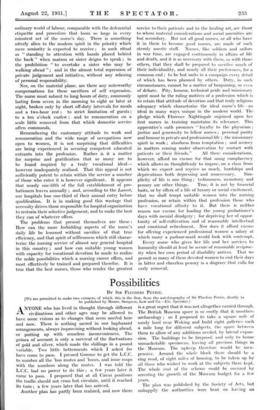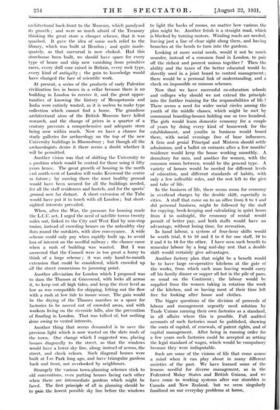Possibilities
BY SIR FLINDERS PETRIE.
which this is the first, from the autobiography of Sir Flinders Petrie, shortly to by Messrs. Sampson, Low and Co.—ED. Spectator.]
[We are permitted to make two extracts, of be published
ANYONE who has lived in thought through different civilizations and other ages may be allowed to have some visions as to changes that seem needed here and now. There is nothing sacred in our haphazard arrangements, always improvising without looking ahead, or putting up with senseless inconveniences. The guinea of account is only a survival of the fluctuations of gold and silver, which made the shillings in a pound variable. Two little betterments which I asked for have come to pass. I pressed Gomme to get the L.C.C. to number all the 'bus routes and 'buses, and issue maps with the numbers along the routes. I was told the L.C.C. had no power to do this ; a few years later it came to pass. I proposed that at all Circus positions the traffic should not cross but circulate, until it reached its turn ; a few years later that has arrived.
Another plan has partly been realized, and now there is a great regret that it was not altogether carried through. The British Museum space is so costly that it smothers archaeology ; so I proposed to take a square mile of sandy land near Woking and build eight galleries each a mile long for different subjects, the space between them to allow of any additions needed, by lateral expan- sion. The buildings to be fireproof, and only to house unmarketable specimens, leaving all precious things in the Museum. The upkeep therefore would be inex- pensive. Around the whole block there should be a ring road, of eight miles of housing, to be taken up by all those who wished to work at the subjects there kept. The whole cost of the scheme could be covered by arresting the growth of the Museum budget for a few years.
The plan was published by the Society of Arts, but unhappily the authorities were bent on having an architectural back-front to the Museum, which paralysed its growth ; and were so much afraid of the Treasury thinking the great store a cheaper scheme, that it was quashed. It gave the idea of some such relief to the library, which was built at Hendon ; and quite inade- quately, as that succursal is now choked. Had this storehouse been built, we should have space for every type of house and ship now vanishing from primitive races, every drill core raised in Britain, every rock type, every kind of antiquity ; the gain to knowledge would have changed the face of scientific work.
At present, a series of the products of early Palestine civilization lies in boxes in a cellar because there is no building in London to receive it, and the great oppor- tunities of knowing the history of Mesopotamia and India were entirely wasted, as it is useless to make type collection which cannot find a home. The grandiose architectural aims of the British Museum have killed research, and the change of prices in a quarter of a century prevents a comprehensive and adequate store being now within reach. Now we have a chance for study galleries for archaeology on the top of the new University buildings in Bloomsbury ; but though all the archaeologists desire it there seems a doubt whether it will be permitted.
Another vision was that of shifting the University to a position which would be central for those using it fifty years hence. The great growth of housing in the north and north-west of London will make Kenwood the centre in future ; by moving there the most healthy ground would have been secured for all the buildings needed, for all the staff residences and hostels, and for the sports' ground now far distant. A short extension of the Tube would have put it in touch with all London ; but short- sighted interests prevailed.
When, after the War, the pressure for housing made the L.C.C. act, I urged the need of satellite towns twenty miles out, linked to the City and West End by non-stop trains, instead of crowding houses on the unhealthy clay flats round the outskirts, with slow conveyance. A wide scheme could only pay when rapidly built up, to avoid loss of interest on the needful railway ; the chance came when a rush of building was wanted. But I was answered that the Council were in too great a hurry to think of a large scheme ; it was only hand-to-mouth extension that could be considered, which crowded up all the street connexions to jamming point.
Another alleviation for London which I proposed was to dam the Thames at Gravesend, with locks all across it, to keep out all high tides, and keep the river level as low as was compatible for shipping, letting out the flow with a rush at low tide to insure scour. The gain would be the drying of the Thames marshes as a space for factories to be moved out of crowded areas, and with workers living on the riverside hills, also the prevention of flooding in London. That was talked of, but nothing done owing to vested interests.
Another thing that seems demanded is to save the precious light which is now wasted on the slate roofs of the town. One change which I suggested was, placing houses diagonally to the street, so that the windows would have a lower sky line, along, instead of across, the street, and check echoes. Such diagonal houses were built at Lee Park long ago, and have triangular gardens back and front, not overlooked by neighbours.
Strangely the various town-planning schemes stick to old conventions, even putting houses facing each other when there are intermediate gardens which might be faced. The first principle of all in planning should be to gain the lowest possible sky line before the windows to light the backs of rooms, no matter how various the plan might be. Another fetish is a straight road, which is blocked by turning motors. Winding roads are needed, leaving just a line of clear sight along them, and having branches at the bends to turn into the gardens.
Looking at more social needs, would it not be much sounder, instead of a common fund in London, to pair off the richest and poorest unions together ? Then the ability and the taxes of the better educated would be directly used in a joint board to control management ; there would be a personal link of understanding, and a check on impossible or ruinous schemes.
Now that we have successful co-education schools and colleges why should we not extend the principle into the further training for the responsibilities of life ? There seems a need for wider social circles among the youth of the middle classes, which might be met by communal boarding-houses holding one or two hundred. The girls would learn domestic economy for a couple of years by doing every kind of homework for the establishment, and youths in business would board there, with social evenings free of base influences. A firm and genial Principal and Mistress should settle admissions, and a ballot on entrants after a few months' residence would keep the house working smoothly. A dormitory for men, and another for women, with the common rooms between, would be the general type. A variety of houses would be needed for different levels of education, and different standards of habits, with only a few inflexible rules, and the rest left to the give and take of life.
In the business of life, there seems room for economy in overhead charges by the double shift, especially in cities. A staff that came on to an office from 8 to 4 and did personal business, might be followed by the staff for copying, book-keeping and calculating in quiet hours from 4 to midnight, the economy of rental would permit of better pay, and both staffs would have an advantage, without losing time, for recreation.
In hand labour, a system of four-hour shifts would be worth trial, 6 to 10 and 2 to 6 for one staff, 10 to 2 and 6 to 10 for the other. I have seen such benefit to muscular labour by a long mid-day rest that a double shift would certainly give advantages.
Another factory plan that might be a benefit would be to have large co-operative kitchens at the gate of the works, from which each man leaving would carry off his family dinner or supper all hot in the pile of pans, so usual on the Continent ; the labour would be supplied from the women taking in rotation the work of the kitchen, and so having most of their time left free for looking after house and clothes.
The bigger questions of the division of proceeds of labour and management urgently need solution by Trade Unions running their own factories as a standard, in all affairs where this is possible. Full audited accounts of such factories must be published, showing the costs of capital, of renewals, of patent rights, and of capital management. After being in running order for a few years such factories could be accepted as setting the legal standard of wages, which would be compulsory because they were indisputable.
Such are some of the visions of life that come across a mind when it can play about in many different societies of the past. We have learned some of the lessons needful for diverse management, as in the Federated Malay States and British Guiana, and we have come to working systems after our stumbles in Canada and New Zealand, but we seem singularly fossilized on our everyday problems at home.































 Previous page
Previous page